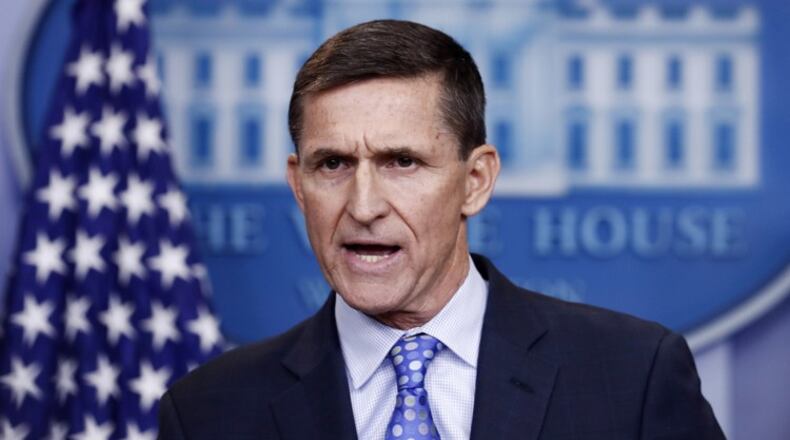A lot of people spent their morning trying to figure out the larger meaning of this (via the AJC ):
"Flynn lied to investigators in January about conversations he had in December 2016 with Russia's ambassador to the U.S., Sergey Kislyak, according to court documents released Friday."
Let's try to sort out a few things. First, Flynn is the highest-profile figure so far to plead guilty in Robert Mueller's investigation of possible collusion between the Trump campaign and Russia during the 2016 election. So it's natural to think his guilty plea and related cooperation puts Mueller's investigators right in the thick of the Trump team.
That said, the timing here is very important. Flynn's lies to the FBI concern meetings he had in December -- after the election, when President-elect Trump was preparing to take office. It's possible these aren't the only meetings between Flynn and Russian officials that interest the FBI, and that there were previous meetings during the campaign. But that's not what these court documents say. If we are talking only about the transition period, that is a very different context than the campaign. Americans might not like Trump's approach to Russia, but as president-elect he was within his rights to begin feeling out foreign governments as he readied his own policies for after his inauguration.
So what was Flynn talking about? The court documents indicate that in the Dec. 22 meeting, Flynn "ask(ed) the Russian Ambassador to delay the vote on or defeat a pending United Nations Security Council resolution" and that the ambassador "described to Flynn Russia's response to his request." In the Dec. 29 meeting, the documents indicate, Flynn asked the ambassador "to refrain from escalating the situation in response to sanctions that the United States had imposed against Russia that same day," and that the ambassador told him "that Russia had chosen to moderate its response to those sanctions as a result of his request."
Again, this happened during the transition. The Obama administration probably didn't like that Trump was doing this, and one might question the wisdom of Flynn's requests. But the legality of them -- in a vacuum, without evidence these conversations were linked to other conversations during the campaign that would represent some kind of collusion -- isn't really in question. Had Flynn told FBI agents the truth about those conversations, there probably wouldn't be a story here.
But. (You knew there was a "but" coming, right?)
But ... we also know that Flynn ran afoul of some of the same laws Paul Manafort did , in terms of failing to register as a lobbyist for a foreign government (in Flynn's case, Turkey) and report income from foreign clients. So the question is whether Flynn reached a deal to avoid charges for those actions, in exchange for information about the Trump campaign and/or transition beyond those December conversations with the Russian ambassador.
So while there's one scenario in which the Mueller investigation is only coming up with peripheral charges that don't ultimately point toward collusion or other wrongdoing by the Trump campaign, there's another scenario in which Mueller is slowly closing in on something, or someone, bigger. He's got Manafort cooperating after pleading guilty to illicit business dealings before joining the Trump campaign; he's got a foreign-policy adviser cooperating after pleading guilty to lying about conversations he had with foreign officials during the campaign; and now he's got Flynn cooperating after pleading guilty to lying about conversations he had with foreign officials after the campaign.
Will those dots ultimately connect to show a noose tightening around the neck of, if not Trump himself, central figures of his campaign and possibly his administration? Or do they represent a thread of sleaze and poor judgment running in parallel to Trump and his political operations without ever touching the latter?
We don't know yet. But it seems likely there's more to find out.
About the Author
The Latest
Featured



